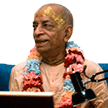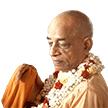Miseries of Life - an essential subject: Difference between revisions
(Created page with "Category:Essential Subjects <!----------------------- edit below this line -----------------------> <!------------------------ begin introduction text below --------------...") |
(Vanibot #0041: Moves Choose Another box to the end) |
||
| Line 2: | Line 2: | ||
<!----------------------- edit below this line -----------------------> | <!----------------------- edit below this line -----------------------> | ||
<!------------------------ begin introduction text below ------------------------> | <!------------------------ begin introduction text below ------------------------> | ||
By living in the material world one is always subjected to miseries. Māyā inflicts the miseries of material life upon the jīva. If a person artificially tries to be something he is not, then he can expect only misery. No one can adjust the sufferings of material existence, but by spiritual culture one can elevate himself from the effects of such miserable life. To liberate oneself from this kind of life one must engages himself/herself in the transcendental loving service of the Lord and understands their real constitutional position as the eternal servitor of the Supreme Personality of Godhead. | |||
Srila Prabhupada's books, lectures, conversations and letters offer a comprehensive presentation of this essential subject as seen in the Vaniquotes '''[[Vaniquotes:Category:Miseries of Life|Miseries of Life]]''' category. An introduction from his books is given below in the following | Srila Prabhupada's books, lectures, conversations and letters offer a comprehensive presentation of this essential subject as seen in the Vaniquotes '''[[Vaniquotes:Category:Miseries of Life|Miseries of Life]]''' category. An introduction from his books is given below in the following 11 quotes. | ||
<!-------- end introduction text and don't touch next three lines ---------> | <!-------- end introduction text and don't touch next three lines ---------> | ||
== Quotes from Srila Prabhupada's books == | == Quotes from Srila Prabhupada's books == | ||
<!----------------- edit quote boxes below this line -----------------> | <!----------------- edit quote boxes below this line -----------------> | ||
{{VaniQuotebox| | {{VaniQuotebox|As long as one is interested in karma and jnana, he continues enduring the miseries of material life - birth, old age, disease and death|As long as one is interested in karma and jñāna, he continues enduring the miseries of material life—birth, old age, disease and death. Karmīs certainly take on one body after another. As far as jñānīs are concerned, unless they are promoted to the topmost understanding, they must return to the material world. As explained in Bhagavad-gītā (7.19): bahūnāṁ janmanām ante jñānavān māṁ prapadyate. '''(Śrīmad-Bhāgavatam 5.5.5)'''}} | ||
{{VaniQuotebox| | {{VaniQuotebox|Every one of us wants to remove the miseries of life, but we do not know how to do it|This illusory energy, or the curtain of māyā, has to be removed, and when it is so done, the living entity can see the Lord face to face, and all his miseries are at once removed. Every one of us wants to remove the miseries of life, but we do not know how to do it. The solution is given here, and it rests on us to assimilate it or not. '''(Śrīmad-Bhāgavatam 1.11.10)'''}} | ||
{{VaniQuotebox| | {{VaniQuotebox|Both the brahmanandis and the premanandis are transcendentalists, and they have nothing to do with the inferior, material nature full of the existential miseries of life|According to Śrīla Viśvanātha Cakravartī, there are two classes of paramahaṁsas, namely the brahmānandīs (impersonalists) and the premānandīs (devotees), and both are awarded their desired destinations, although the premānandīs are more fortunate than the brahmānandīs. But both the brahmānandīs and the premānandīs are transcendentalists, and they have nothing to do with the inferior, material nature full of the existential miseries of life. '''(Śrīmad-Bhāgavatam 2.4.13)'''}} | ||
{{VaniQuotebox| | {{VaniQuotebox|Foolish people who are after more wealth, more wives and more children worship various demigods. The aim of life is to end the miseries of life and not to increase them| More wealth, more women and false aristocracy are some of the demands of the materially disposed man because he has no information of the benefit derived from Viṣṇu worship. By Viṣṇu worship one can derive benefit in this life as well as in life after death. Forgetting these principles, foolish people who are after more wealth, more wives and more children worship various demigods. The aim of life is to end the miseries of life and not to increase them. '''(Śrīmad-Bhāgavatam 1.2.27)'''}} | ||
{{VaniQuotebox| | {{VaniQuotebox|Herein it is suggested that anyone who wants to make an end to these miseries of life, namely repetition of birth, death, disease, and old age, must take to this process of worshiping the Supreme Lord and not others| Herein it is suggested that anyone who wants to make an end to these miseries of life, namely repetition of birth, death, disease, and old age, must take to this process of worshiping the Supreme Lord and not others, as it is also ultimately suggested in the Bhagavad-gītā (18.65). If we at all want to end the cause of our conditioned life, we must take to the worship of Lord Śrī Kṛṣṇa, who is present in everyone's heart by His natural affection for all living beings, who are actually the parts and parcels of the Lord. '''(Śrīmad-Bhāgavatam 2.2.6)'''}} | ||
{{VaniQuotebox| | {{VaniQuotebox|Maya inflicts the miseries of material life upon the jiva. If a person artificially tries to be something he is not, then he can expect only misery|Lord Caitanya discusses in detail the jīva's eternal constitutional position as Lord Kṛṣṇa's servant, and how the jīva is put into illusion, or māyā, when he tries to be the supreme enjoyer. Lord Caitanya further explains that when the jīva forgets his eternal position as a servant of Lord Kṛṣṇa, he becomes eternally conditioned and illusioned. Thus māyā inflicts the miseries of material life upon the jīva. If a person artificially tries to be something he is not, then he can expect only misery. '''(Renunciation Through Wisdom, Chapter 3.4)'''}} | ||
{{VaniQuotebox| | {{VaniQuotebox|No one can adjust the sufferings of material existence, but by spiritual culture one can elevate himself from the effects of such miserable life|No one can adjust the sufferings of material existence, but by spiritual culture one can elevate himself from the effects of such miserable life. As an example one may cite the condition of a dry coconut. The dry coconut pulp automatically becomes separated from its outer skin. Similarly, the outer skin, or the gross and subtle material coverings of the soul, automatically separates from the spirit soul, and the spirit soul can then exist in spiritual existence, even though apparently within the dry skin. '''(Light of the Bhāgavata, Chapter 36)'''}} | ||
{{VaniQuotebox| | {{VaniQuotebox|One must realize the nullity of the material phenomenon, considering it a passing phantasmagoria, and must endeavor to make a solution to the miseries of life|One must realize the nullity of the material phenomenon, considering it a passing phantasmagoria, and must endeavor to make a solution to the miseries of life. Self-complacence with a polished type of animal civilization geared to sense gratification is delusion, and such a "civilization" is not worthy of the name. In pursuit of such false activities, a human being is in the clutches of māyā, or illusion. '''(Śrīmad-Bhāgavatam 2.2.4)'''}} | ||
{{VaniQuotebox|The lowest of fools do not understand material miseries; they pass their lives merrily and do not inquire into the miseries of life|The lowest of fools do not understand material miseries; they pass their lives merrily and do not inquire into the miseries of life. Such persons are almost on the level of the animals, who, although in the eyes of superiors are always miserable in life, are unaware of material distresses. A hog's life is degraded in its standard of happiness, which entails living in a filthy place, engaging in sex enjoyment at every opportune moment, and laboring hard in a struggle for existence, but this is unknown to the hog. '''(Śrīmad-Bhāgavatam 3.7.17)'''}} | |||
{{VaniQuotebox|The entire world is under the illusion that people will be happy by advancing in materialistic measures to counteract the miseries of conditional life, but this attempt will never be successful|The entire world is under the illusion that people will be happy by advancing in materialistic measures to counteract the miseries of conditional life, but this attempt will never be successful. Humanity must be trained to engage in the transcendental loving service of the Lord. That is the purpose of the Kṛṣṇa consciousness movement. There can be no happiness in changing one's material conditions, for everywhere there is trouble and misery. '''(Śrīmad-Bhāgavatam 7.9.17)'''}} | |||
{{VaniQuotebox|They have many subject matters for hearing - political, scientific, social, economic and so on - but due to a poor fund of knowledge, they set aside the question of the ultimate miseries of life, namely miseries of birth, death, old age and disease|They have many subject matters for hearing—political, scientific, social, economic and so on—but due to a poor fund of knowledge, they set aside the question of the ultimate miseries of life, namely miseries of birth, death, old age and disease. Factually, the human life is meant for making an ultimate solution to birth, death, old age and disease, but the gṛhamedhīs, being illusioned by the material nature, forget everything about self-realization. '''(Śrīmad-Bhāgavatam 2.1.2)'''}} | |||
<!----------------- edit quote boxes above this line -----------------> | <!----------------- edit quote boxes above this line -----------------> | ||
| Line 30: | Line 36: | ||
'''Miseries of Life - [[Vaniquotes:Category:Miseries of Life|explore more within this category]]'''. | '''Miseries of Life - [[Vaniquotes:Category:Miseries of Life|explore more within this category]]'''. | ||
{{EsentialSubjectTotal}} | {{EsentialSubjectTotal}} | ||
<div style="float:left;"> | |||
{{EssentialSubjectnav}} | |||
</div> | |||
__NOTOC__ | __NOTOC__ | ||
__NOEDITSECTION__ | __NOEDITSECTION__ | ||
Latest revision as of 16:57, 22 November 2020
By living in the material world one is always subjected to miseries. Māyā inflicts the miseries of material life upon the jīva. If a person artificially tries to be something he is not, then he can expect only misery. No one can adjust the sufferings of material existence, but by spiritual culture one can elevate himself from the effects of such miserable life. To liberate oneself from this kind of life one must engages himself/herself in the transcendental loving service of the Lord and understands their real constitutional position as the eternal servitor of the Supreme Personality of Godhead.
Srila Prabhupada's books, lectures, conversations and letters offer a comprehensive presentation of this essential subject as seen in the Vaniquotes Miseries of Life category. An introduction from his books is given below in the following 11 quotes.
Quotes from Srila Prabhupada's books
Miseries of Life - explore more within this category.
Vanipedia has now over 903 introductory articles compiled from Srila Prabhupada's books under the series titled Essential Subjects. All these articles can be seen in the Table of Content on the right side of this article and also here in this Umbrella Category. Browse through them to relish the breadth and depth of Srila Prabhupada's teachings - There is a subject for everyone.










